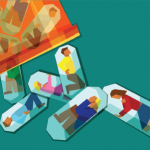 More than 15 years ago, researchers identified fatigue as an important and common issue for individuals with rheumatoid arthritis (RA). Patients describe the fatigue as “extreme and persistent tiredness, weakness or exhaustion—mental, physical, or both.” The answers to why unusual fatigue is associated with RA and what causes it are complex and multi-factorial, and largely remain unclear.
More than 15 years ago, researchers identified fatigue as an important and common issue for individuals with rheumatoid arthritis (RA). Patients describe the fatigue as “extreme and persistent tiredness, weakness or exhaustion—mental, physical, or both.” The answers to why unusual fatigue is associated with RA and what causes it are complex and multi-factorial, and largely remain unclear.
Even when rheumatologists manage RA optimally with disease-modifying anti-rheumatic drugs and biologic therapies, the pharmacological agents provide only small benefits for fatigue. Because of this, healthcare practitioners have proposed non-pharmacological interventions that may alter the potential causal pathways of RA fatigue. In 2013, a Cochrane Review found moderate evidence supporting the use of one approach: physical activity. The review also indicated that psychosocial interventions, such as self-management programs, cognitive-behavioral approaches and lifestyle interventions, had the potential to help patients manage their RA-associated fatigue, although the evidence supporting the use of psychosocial interventions was considered low quality.1
Recently, the lead author of the 2013 review, Fiona Cramp, PhD, director of the Centre for Health & Clinical Research at the University of the West of England, Bristol, updated these findings in a narrative review. Published online Nov. 1, 2019, in Rheumatology, the narrative review highlights the complex nature of fatigue. The analysis continues to indicate that physical activity and psychosocial interventions provide small to moderate benefits for self-reported fatigue in adults with RA. The review also suggests patients require personalized approaches to solve the problem of fatigue.2
The new review analyzed eight studies evaluating the effect of non-pharmacological interventions for fatigue in adults with RA. The studies were limited because they did not consistently measure fatigue and had minimal data on long-term outcomes and cost effectiveness. The interventions also varied, and the review lacked an analysis of the effect of the interventions on fatigue mechanisms.
Three of the four studies that investigated physical activity reported significant improvement in the fatigue of RA patients at the end of the intervention compared with their control arms. However, the interventions varied. Example: One successful intervention was an individualized home exercise plan designed to target the functional limitations identified by participants via the Health Assessment Questionnaire. The wide range of physical activity interventions assessed in the different studies meant Dr. Cramp had difficulties determining a specific intervention recommendation.
Clinical psychologists delivered most of the psychosocial interventions described in the review, and the strongest evidence was for group-based cognitive behavioral approaches. The interventions focused on “behaviors likely to be related to fatigue and their underpinning thoughts and feelings,” and the effects remained significant at the two-year follow-up.

